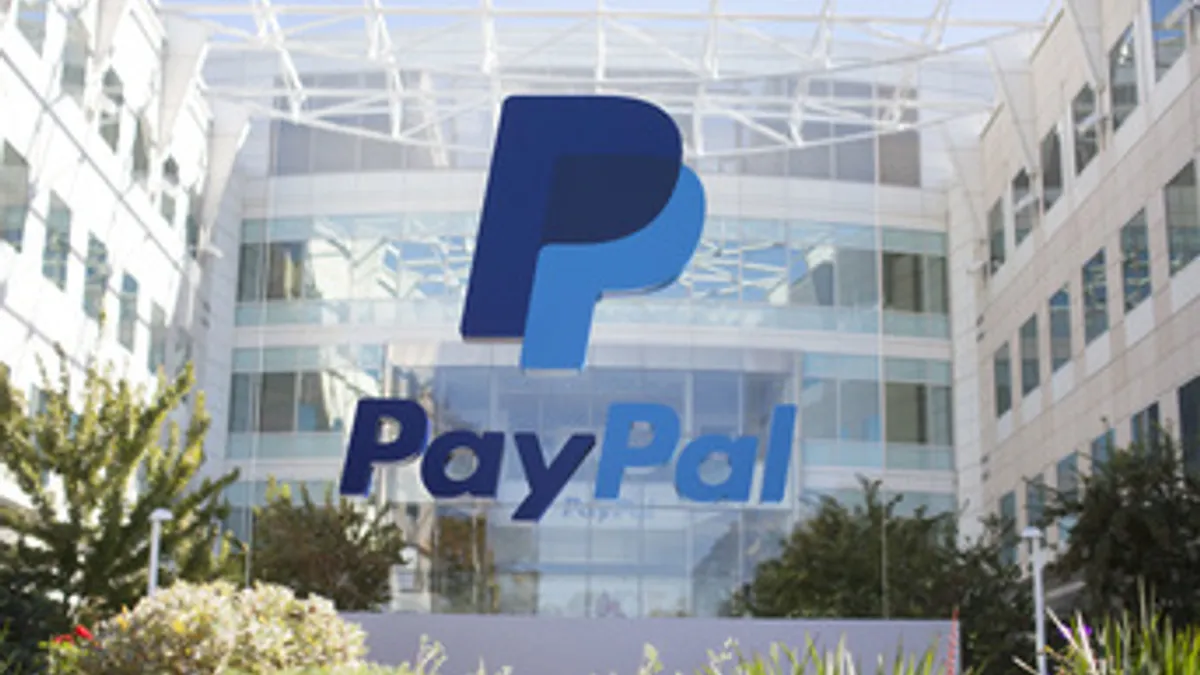Dive Brief:
- PayPal has pulled out of the Libra Association, Facebook's effort to develop a cryptocurrency, the payment company said in a statement Friday. The company was absent from a Thursday meeting of the project's 27 other backers.
- The Libra Council is holding its first meeting Oct. 14 in Geneva, where representatives of backing companies could sign Libra's charter, according to a memo seen by The Wall Street Journal.
- PayPal's departure leaves four payment companies attached to the project — Visa, Mastercard, Stripe and PayU — but some of those companies were reconsidering signing the charter, Bloomberg reported earlier in the week.
Dive Insight:
Government officials on both sides of the Atlantic have scrutinized Libra's development from the start. The European Union's antitrust chief, Margrethe Vestager, said she's wary the currency could create a new, separate economy. Bruno Le Maire, France's finance minister, urged the continent last month to block the currency and create a public alternative. And in July, David Marcus, the Facebook executive in charge of the project, faced two days of hearings on Capitol Hill, where U.S. lawmakers raised concerns that Libra could be used in money laundering.
PayPal's departure may trigger more congressional hearings to discover details on why the company walked away, research firm Cowen said, according to Bloomberg.
The payment company left open the possibility of future partnerships with the social media giant.
"PayPal has made the decision to forgo further participation in the Libra Association at this time and to continue to focus on advancing our existing mission and business priorities as we strive to democratize access to financial services for underserved populations," the company said in a statement emailed to Bloomberg on Friday. "We remain supportive of Libra's aspirations and look forward to continued dialogue on ways to work together in the future."
Dante Disparte, head of policy and communications for the Libra Association, confirmed PayPal's decision and defended the Libra project in a series of tweets Friday.
"We recognize that change is hard, and that each organization that started this journey will have to make its own assessment of risks and rewards of being committed to seeing through the change that Libra promises," he wrote.
The Treasury Department sent letters to several payment companies asking how Libra would fit into their money laundering compliance programs, The Wall Street Journal reported.
"Other payment players are getting cold feet," Raymond Pucci, director of the merchant services practice at Mercator Advisory Group, told American Banker. "So no one but Facebook right now has skin in the game. Not much in the win column for Libra right now."
Marcus sought to curb any perception of restlessness in a series of tweets before PayPal publicly split from the project. "I have no knowledge of specific organizations [sic] plans to not step up," he wrote. "We're very calmly, and confidently working through the legitimate concerns that Libra has raised by bringing conversations about the value of digital currencies to the forefront."
PayPal's departure is notable because Marcus served as president of that company until 2014, when he left for Facebook.
Cowen analyst Jaret Seiberg told Bloomberg that Facebook lost the "messaging war" and failed to win Washington's "buy in," adding that other backers may follow PayPal's lead rather than "risk getting pulled into the policy fights over privacy and private currencies."
The consequences are likely minimal for PayPal. Libra Association members signed nonbinding agreements before the project was unveiled in June. And they haven't yet been required to submit the agreed $10 million-apiece investment in the project.
The payment company began the week by becoming the first foreign payment platform to be licensed to provide online payment services in China. It received approval from The People’s Bank of China to acquire 70% equity interest in Guofubao Information Technology Co. (GoPay) Ltd.














